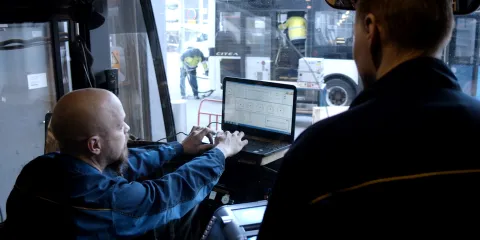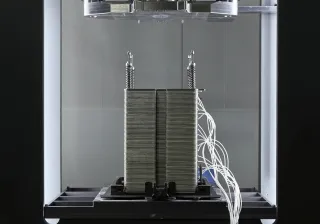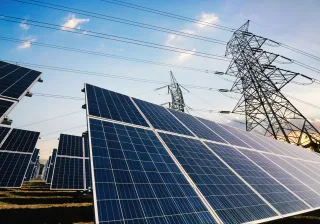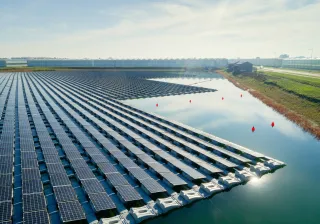Battery technologies

Batteries play a key role in the ongoing shift from the use of fossil fuels towards sustainable transportation and renewable energy production. As an innovative R&D partner, we support you in developing high-performance, lightweight, safe, low-cost and sustainably sourced and manufactured batteries to store renewable energy and power electric vehicles.
Battery research at VTT
We conduct experimental performance testing of cells, modules and packs as well as develop tools for battery system design, battery management and optimal operation to support the development and deployment of the systems.
Our goal is to increase the sustainability of batteries by developing new materials and manufacturing and recycling methods, and by increasing their lifetime and energy density.
We support the development and testing of novel battery materials and manufacturing processes in lab and pilot scale.

Batteries enable sustainable transportation and renewable energy storage
The electrification of harsh-use applications, such as heavy-duty vehicles, non-road mobile machines and marine vessels, provides significant potential for increasing energy-efficiency and performance as well as decreasing local emissions. The benefits of efficient electrification are, for example, improved productivity and user experience and lower total cost of ownership.
In addition, the increasing need for sustainable solutions for stationary energy storage creates opportunities for new battery technologies.
To ensure the sustainability of electrification, we should guarantee ethical raw material sourcing and consider the limitations in material availability. This creates a clear need for efficient recycling and tracking solutions, novel battery chemistries and methods to increase battery lifetime.

Our offering
With our expertise, infrastructure, global connections and business understanding, we can support you with your energy storage needs throughout the value chain. Here are some areas we can make a difference in:
- Requirement specification
- Technology assessment and selection
- Systems engineering
- BMS and energy management
- Testing and validation
- Grid integration
- Battery health monitoring and prognostics
- Lifecycle management
- Sustainability assessment
- Optimisation of battery healthy and lifetime
- Future bio-based energy storage solutions
In addition, VTT can support the battery sector to test and develop novel battery materials and manufacturing processes, even in pilot scale.
We support research and industry throughout the battery value chain.
The following image describes our main activities in the energy storage field, throughout the whole value chain and in a circular economy fashion.
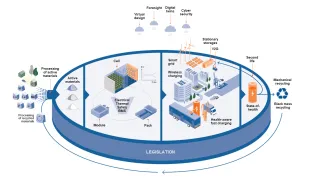
Turning forestry side streams to high performance materials for energy storage applications
Side streams from forestry and pulping industry
~ 23 Mt/a of bark recovered in EU
~ 78 Mt/a of kraft lignin in form of black liquor produced worldwide
Carbonization technologies
Expertise to produce hard carbons, activated carbons and graphitic carbon materials with tailorable properties.
Sustainable energy storage devices
Increasing the share of renewable materials in batteries.
Applied battery research facilities
We have developed competences and facilities for applied energy storage R&D since 2010. Our research laboratories enable comprehensive experimental work on battery cells, modules and packs, as well as battery management systems and thermal management. These facilities are integrated with dynamometer facilities enabling experimental work not just on batteries, but also on heavy-duty vehicles, drivetrains and engines under the same roof. With our high-power battery emulator, we can test electric vehicle prototypes on the dynamometer even without a real battery installed in the vehicle.
We have also recently built competences for battery safety testing at cell level. Having tested hundreds of batteries, we can provide state-of-the-art knowledge, foresight and experimental research services. The backbone of these services is experimental work combined with modelling capabilities and tools.

Related infrastructure
We have both laboratory and pilot scale facilities where we can print and coat different battery materials and layers.
Next generation batteries and supercapacitors
We develop processes and materials for sustainable next-generation batteries. We specialise in a wide range of battery chemistries, from lithium-ion, sodium-ion and solid-state batteries to supercapacitors.
Our goals are twofold:
- We utilise abundant, bio-based and locally available raw materials, or even waste resources in batteries. This helps you to cope with limited material availability and increases the resilience of supply chains. We have created a process for Na-ion battery manufacturing and testing, and we are also developing biocarbon materials and organic batteries. These batteries are suitable for applications where extremely high energy density is not needed, such as stationary storage.
- We develop processes and materials for solid-state batteries with high energy density. Such batteries are especially suitable for mobility and wearable electronics applications. We minimise the greenhouse gas emissions of solid-state battery production by using energy-efficient processes, such as dry extrusion coating. In addition, we increase the lifetime of the batteries by self-healing methods and stabilising the interfaces.
We offer a platform to test both standard and novel battery processing methods and help you to upscale production using inline inspection methods. We also have the capability to assemble both coin and pouch cells in an inert atmosphere. Our unique printed intelligence facilities and know-how enable the integration of batteries with other components, such as solar cells, sensors and LEDs.
Videos on battery technologies
Sustainable battery development at VTT
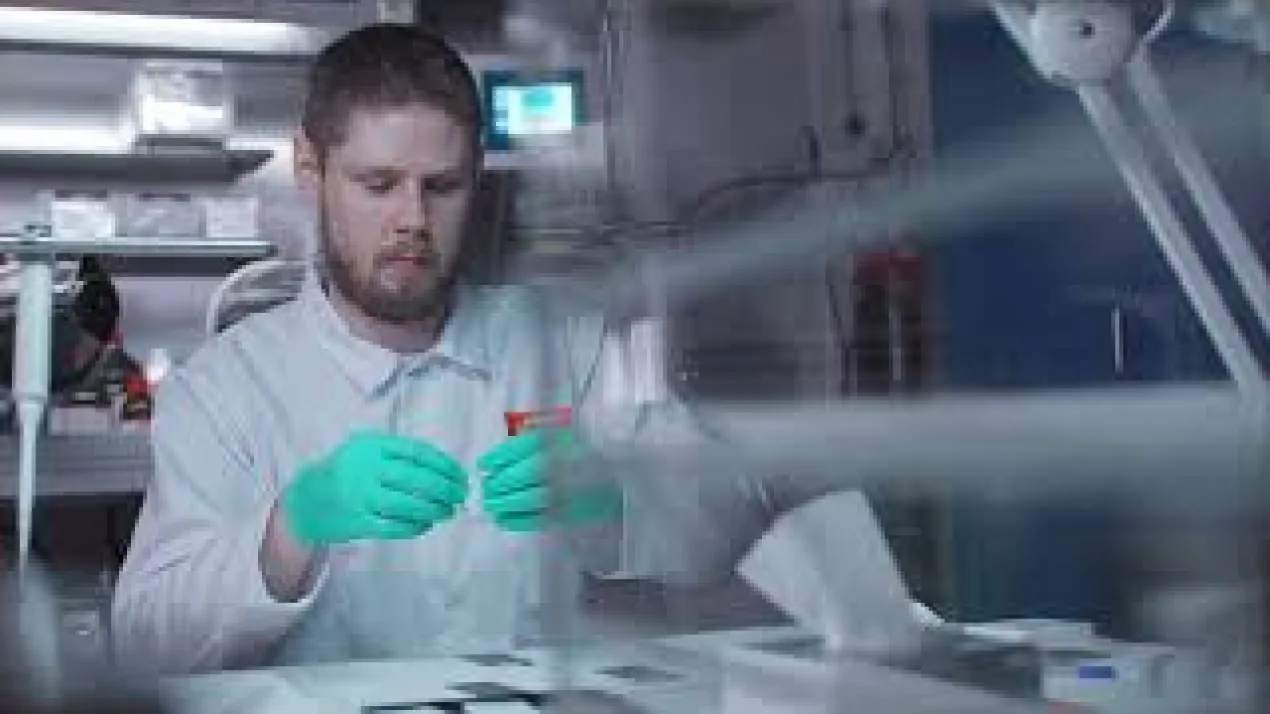
Electric vehicles and battery technologies
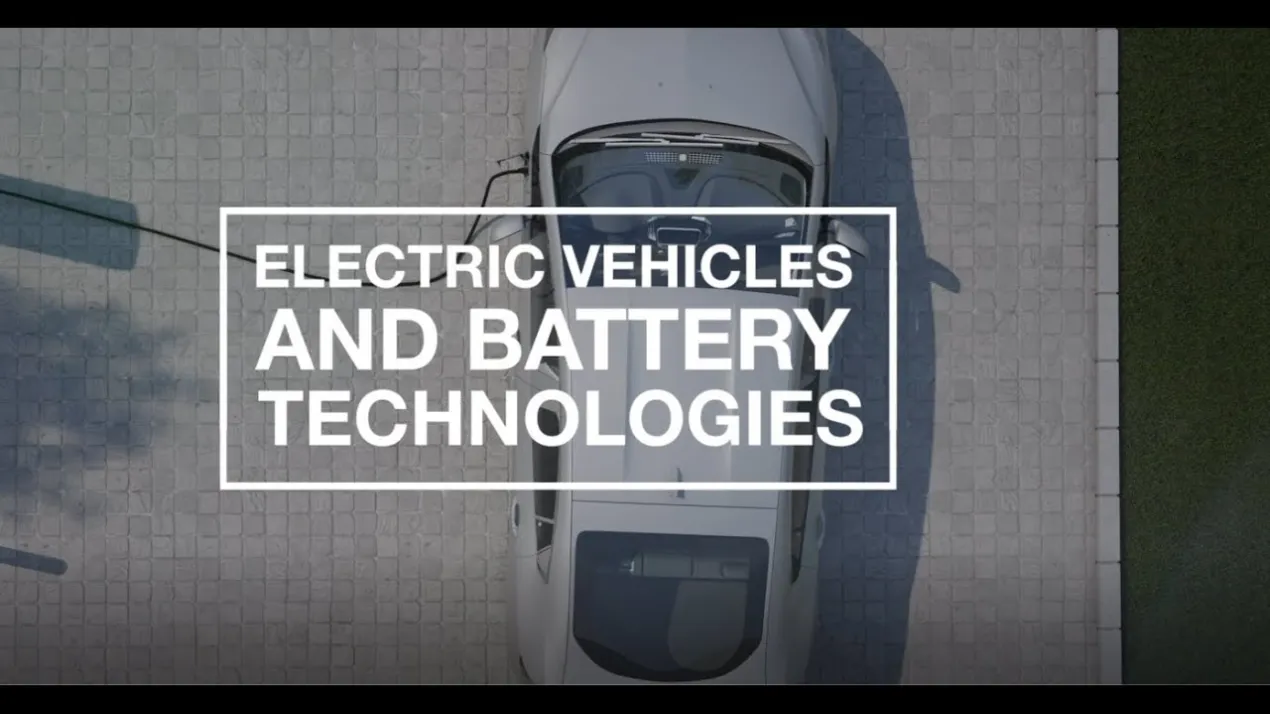
Projects
- VTT leads the Bioboost project revolutionizing the use of kraft lignin
- VTT coordinates a Battery 2030+ H2020 project about self-healing batteries
- VTT coordinates a Horizon Europe project on solid-state battery manufacturing
- VTT participates in a national project to develop manufacturing of solid-state batteries
- VTT coordinates a Horizon Europe project on advanced battery management by multidomain digital twins
- VTT coordinates a Horizon Europe project on next generation technologies for battery systems in transport electrification
- VTT participates in a Horizon Europe project on reconfigurable BMS to ensure interoperability, safety and reliability in 2nd life BESS
- BIG LEAP Project (webpage under construction)
- VTT participates in a Horizon Europe project on digitalisation of battery testing
- VTT participates in a national project to develop methodology for optimal use of batteries in non-road mobile machinery
- VTT participates in a national project to develop recycling of Li-ion batteries
FAQ – Frequently Asked Questions about battery technologies
What do VTT’s battery technology services include?
VTT supports R&D for high-performance, lightweight, safe and low-cost batteries tailored for EVs and renewable energy storage.
At what scale do you work?
Services range from lab testing of cells, modules and packs to pilot-scale manufacturing and battery system design tools.
How does VTT support battery sustainability?
VTT advances sustainably sourced materials, efficient manufacturing, extended battery lifetime, and innovative recycling methods.
What industry applications are covered?
Use cases include electric vehicles, heavy-duty transport, marine vessels, stationary energy storage, and harsh-use equipment.
What unique infrastructure does VTT offer?
You get access to performance testing, battery management system development, pilot manufacturing lines, and recycling research platforms.
This FAQ is written by AI and checked by a human.
How to work with us
-
Contact us!
Tell us what you want to do, and we will figure out how to do it. No project is too small or too ambitious – we would love to hear from you. After the initial assessment, we might be able to offer some of the options listed below.
-
Customised partnership
Every research case is unique, and we're happy to tailor our services to your needs. You will get full ownership of the intellectual property rights of any project we undertake together.
-
Cooperative project
We frequently participate in research and development projects with multiple business partners and funding agencies. In cooperative projects, the risk is split between multiple organisations and everyone benefits from the results.
-
Our networks at your disposal
We are happy to put you in touch with the ideal sparring and development partner.
Publications related to battery technologies
We have a large database of publications in our research portal Pure. Find peer reviewed publications related to battery technologies by clicking the button below.
Meet our experts

Dr. Ari Hentunen is a Research Team Leader at VTT. He holds a DSc (Tech) degree from Aalto University. He has worked for over 15 years with EV technologies and battery storage systems, and he has strong knowledge in the experimental performance characterisation of lithium-ion batteries as well as electric vehicle technologies. Dr. Hentunen’s main interests are performance and lifetime characterization of batteries, grid integration and operational optimization of battery storages, and battery management and health diagnostics. He has been a project manager and work package leader in several research projects at European and national level. He is a member in BEPA TWG3 & TWG4 and Batteries Europe WG5 & WG6, and he contributes to EERA JP ES SP1 & SP6.

Dr. Sam Mousavi is a Research Scientist at VTT, with over 15 years of experience in the field of electrochemical energy storage. He holds a PhD in electrochemistry and completed a two-year postdoctoral position at Aalto University. His expertise spans from redox flow batteries to next-generation battery systems, with a strong focus on sustainable materials and scalable processing techniques.
At VTT, Dr. Mousavi leads the development of innovative materials and fabrication methods for advanced battery technologies, including solid-state lithium metal batteries and sodium-ion batteries mainly based on earth-abundant or bio-derived materials. He is currently the Work package leader in two European projects, SOLiD and TwinVECTOR, both of which target the development of sustainable high-energy-density lithium metal batteries with enhanced safety and extended cycle life.
In addition to his EU project leadership, he is actively engaged in customer-driven R&D projects, supporting industry partners in the evaluation and integration of novel battery materials and manufacturing solutions. His work combines experimental electrochemistry, materials characterization, and process design to advance sustainable battery technologies aligned with future energy storage needs.

Dr. Chamseddine Guizani is a senior scientist at VTT in the Lignin and Side Streams Valorization team, and a Research Council of Finland Fellow (2023–2027, project 357161). He holds a PhD from the National Polytechnic Institute of Toulouse and has over 10 years of experience in the refining and conversion of biomass and biopolymers into sustainable materials and chemicals.
His research focuses on the refining and thermal conversion of lignocellulosic side streams into advanced energy storage materials. His main interests include the fundamentals of biopolymer carbonization, the engineering and characterization of bio-based carbon materials, and the development of property–electrochemical performance relationships using data-driven approaches.


